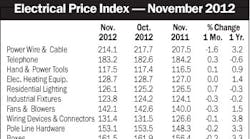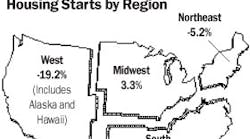No one expected the third-quarter earning reports published in recent weeks by publicly held electrical manufacturers and distributors to offer much good news about the economy. Profits and sales in the last quarter for most companies reflected an economy that still hasn't found the necessary footing for a prolonged recovery.
The Commerce Department figures on manufacturers' shipments released earlier this week reinforced what many CEOs said in their analysis of their companies' financial results — that the industrial market remains the weakest link in the U.S. economy.
Orders to factories dropped 2.3 percent in September, the second straight monthly decline. Year-to-date, new orders for 2003 were 1.7 percent below the same period a year ago. Additionally, last week's government report that 49,000 factory jobs were lost in October marked the 27th straight month in which manufacturing jobs were eliminated.
As you will see in the following excerpts from the financial reports of publicly held electrical manufacturers and distributors, most companies are now focusing on positioning their companies for an economic recovery that they don't expect to start until the second-half of 2003 or 2004.
Timothy H. Powers, president and CEO, Hubbell Inc. “Our forecast called for a difficult full year in most of our markets — residential and the home center channel were exceptions — and that has proven to be the case. In the third quarter, no new trends either positive or negative have appeared in the wide range of markets that the company serves.
“Our outlook also remains unchanged, and it is essentially conservative. Over the next two-to-four quarters, industrial markets are likely to remain flat to current levels, nonresidential construction will probably weaken somewhat, and utility markets will remain slow as that industry struggles with questions of financing and return on infrastructure investment awaiting direction from federal energy policy.”
“One facet of our 2002 business plan envisioned opportunities in managing for the reality of a sluggish economy. We've made significant strides with a striking contrast between the depressed state of the industrial economy and the third quarter results achieved by the 12,000 people at Hubbell.”
John Riley Jr., chairman, president and CEO, Cooper Industries Inc.
“At this point, we have no reason to be optimistic regarding fourth-quarter economic conditions. We have seen few signs of significant upturn in any of our markets, and activity in the commercial construction sector is likely to deteriorate even further over the near term.”
Larry Powers, chairman, president and CEO, Genlyte Group “The outlook for the fourth quarter is that the overall business will remain soft. We also expect some softness in the residential market, compounding the weakness in the commercial and industrial construction markets. We continue to aggressively pursue revenue opportunities in schools and government projects. Nevertheless, I believe the fourth quarter as well as most of 2003 will be very challenging.”
James McNerney, 3M chairman and CEO “There are no clear signs of improving global economic conditions.”
Kevin Dunnigan, chairman and CEO, Thomas & Betts Corp. “The company does not expect any meaningful recovery in market demand for the rest of 2002.”
Richard Keyser, chairman and CEO, W.W. Grainger Inc. “While operating performance of our three business segments improved, sales results for the quarter confirm that we are not yet seeing a recovery in the North American economy.”
Roy Haley, chairman and CEO, WESCO International Inc. “We have been placing a high priority on protecting and improving our base business. Since we don't anticipate significant near-term improvement in general economic activity, this strategy of focusing on operational capabilities will continue into 2003.”

